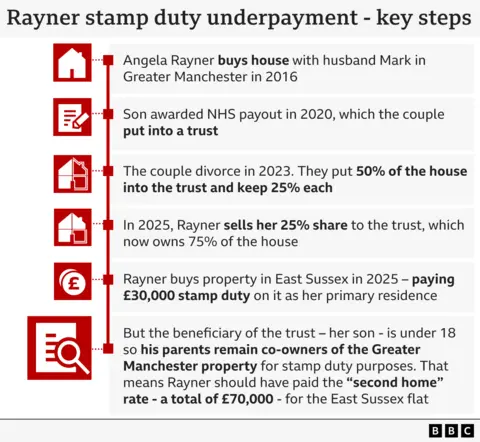Starmer refuses to say if he would sack Rayner pending ministerial probe
Deputy prime minister referred herself to standards adviser after admitting she underpaid stamp duty on an £800,000 flat
Prime Minister Sir Keir Starmer said he would “of course act” on the findings of the prime minister’s standards adviser but declined to say whether he would sack Deputy Prime Minister and Housing Secretary Angela Rayner if the adviser concluded she had breached the ministerial code.
Rayner has referred herself to Sir Laurie Magnus after admitting she paid less stamp duty than she should have on a three-bedroom flat in Hove, East Sussex, bought earlier this year for £800,000. She has told colleagues the shortfall was the result of incorrect legal advice and has denied any intention to dodge tax.

Officials and advisers are assembling a detailed timeline of Rayner’s property transactions and the legal advice she received. According to accounts provided by Rayner, a family home in Ashton-under-Lyne, Greater Manchester, was partly transferred into a trust set up for her severely disabled son. During her divorce, Rayner sold her remaining stake in that family home to the trust and received a lump sum, which she says together with a mortgage funded the Hove purchase. She says she was advised she would only need to pay the standard rate of stamp duty on the new purchase.
The arrangement has been scrutinised by opposition parties and press reports after it emerged that Rayner may have saved about £40,000 by not paying the higher rate of stamp duty typically levied on additional property purchases. Rayner made a public admission that she had underpaid and said she had alerted HM Revenue and Customs and referred herself to Sir Laurie for an independent assessment of whether she breached the Ministerial Code.

The conveyancing firm used by Rayner said it did not give tax advice and that it calculated the stamp duty based on the facts and information provided to it. Allies of Rayner have said she took advice from her conveyancer and from two experts on trust law. Tax specialists, however, say HMRC can levy penalties when tax has been underpaid if the taxpayer has been “careless” and that a penalty typically ranges from 20% to 30% of the underpayment.
If HMRC deems Rayner to have been careless, that could mean an additional penalty on top of the roughly £40,000 in underpaid stamp duty. Independent stamp duty experts told reporters the outcome would depend on whether Rayner sought specialist tax advice and on the documentation of that advice.
Ministers have publicly backed Rayner while the inquiry proceeds. Starmer told the BBC he expected Sir Laurie’s report to be “comprehensive” and delivered quickly but repeatedly refused to be drawn on the prospect of removing her from office if the adviser concluded she had broken rules. He rejected comparisons with previous prime ministers’ handling of misconduct cases, saying each case must be judged on its own merits.
Conservative MPs urged that Rayner should resign, with party figures saying the ministerial position was untenable if the adviser found a breach. Labour colleagues and several cabinet ministers have defended Rayner’s explanation that she received incorrect legal advice and have pointed to the family circumstances that complicated the property transactions.
Sir Laurie Magnus has recently been asked to investigate ministers’ conduct in several high-profile cases. Precedent suggests such inquiries can be completed within days: an inquiry into Nadhim Zahawi’s tax affairs in January 2023 lasted six days, and an earlier probe into a different minister took eight days. Political analysts say the standards adviser’s report will provide the factual basis for the prime minister’s decision, but the ultimate call on dismissal rests with the prime minister.
Lawyers and ethics specialists said the inquiry will focus on whether Rayner’s actions were careless, whether she took appropriate professional advice and whether she declared the circumstances to the appropriate authorities. The ministerial code requires ministers to act with propriety and to be transparent about any personal matters that may have bearing on their public duties.
The episode presents a particular political risk because Rayner is both housing secretary and deputy prime minister, roles that place her at the centre of Labour’s government and its messaging on standards in public life. Commentators noted the irony of a housing minister being at the centre of a tax story tied to property and said the political consequences depend on the adviser’s findings and any subsequent HMRC action.
Rayner’s office said she had cooperated fully with inquiries, had self-referred to both HMRC and the standards adviser, and was not resigning while the independent investigation runs. The opposition has continued to press for full disclosure of the legal advice Rayner received and for clarity on the paperwork and timing of all transactions.
The standards adviser’s conclusions and any HMRC determination on penalties are expected in the coming days. Once Sir Laurie delivers his report, the prime minister will assess whether Rayner’s position is tenable under the ministerial code and take any necessary action.